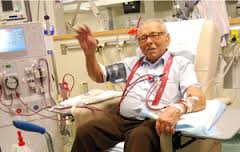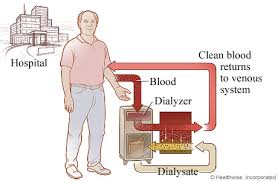Dialysis is a treatment for kidney failure that removes waste and extra fluid from the blood, using a filter. In hemodialysis (HD), the filter is a plastic tube filled with millions of hollow fibers, called a dialyzer. Hemodialysis is the most common way to treat advanced kidney failure. The procedure can help you carry on an active life despite failing kidneys. Hemodialysis requires you to follow a strict treatment schedule, take medications regularly and, usually, make changes in your diet. Hemodialysis is a serious responsibility, but you don’t have to shoulder it alone. You’ll work closely with your health care team, including a kidney specialist and other professionals with experience managing hemodialysis. You may be able to do hemodialysis at home. Peritoneal (per-ih-toe-NEE-ul) dialysis is another way to remove waste products from your blood when your kidneys can no longer do the job adequately. During peritoneal dialysis, blood vessels in your abdominal lining (peritoneum) fill in for your kidneys, with the help of a cleansing fluid that flows into and out of the peritoneal space.
Hemodialysis is typically conducted in a dedicated facility with specialized nurses and technicians who specialize in hemodialysis. However, dialysis can also be done in a patient’s home. Once you and your doctor have determined that at home hemodialysis is right for you, you will begin a comprehensive safety and training program that is tailored to your specific medical and learning needs.
In most cases, you will learn to perform at home hemodialysis treatments with a dialysis partner. An access will have to be created to allow blood to flow from your body to the dialyzer, so it can filter waste and remove extra fluid from your body. There are different ways to create an access, and you will discuss with your doctor which one is right for you and your treatment.
There are three types of at home hemodialysis:
- Short Daily at Home Hemodialysis – Performed five or six times a week, typically for two to three hours per session.
- Traditional at Home Hemodialysis – Performed three times per week, typically for about four hours per session. This is similar to the treatments received at a local dialysis center.
- Nocturnal Home Hemodialysis – Performed during sleep, typically six to eight hours a night, three or more nights a week. Many patients enjoy the ability to spend the night dialyzing and not lose time during the day that could be spent at work or with family.
When is dialysis needed?
You need dialysis if your kidneys no longer remove enough wastes and fluid from your blood to keep you healthy. This usually happens when you have only 10 to 15 percent of your kidney function left. You may have symptoms such as nausea, vomiting, swelling and fatigue. However, even if you don’t have these symptoms yet, you can still have a high level of wastes in your blood that may be toxic to your body. Your doctor is the best person to tell you when you should start dialysis.
How long will each hemodialysis treatment last?
In a dialysis center, hemodialysis is usually done 3 times per week for about 4 hours at a time. People who choose to do hemodialysis at home may do dialysis treatment more frequently, 4-7 times per week for shorter hours each time.
Your doctor will give you a prescription that tells you how much treatment you need. Studies have shown that getting the right amount of dialysis improves your overall health, keeps you out of the hospital and enables you to live longer. Your dialysis care team will monitor your treatment with monthly lab tests to ensure you are getting the right amount of dialysis. One of the measures your dialysis care team may use is called urea reduction ratio (URR). Another measure is called Kt/V (pronounced kay tee over vee). Ask your dialysis care team what measure they use and what your number is. To ensure that you are getting enough dialysis:
- *your Kt/V should be at least 1.2 or
- *your URR should be at least 65 percent.
Can I have hemodialysis at home?
Possibly. Many patients have their hemodialysis treatments at home. The doctor will let you know if that is ideal for your state of kidney failure and where you are at for your optimal level of treatment.
Do I need to eat a special diet?
Yes. Generally speaking, patients on dialysis are advised to increase their protein intake and limit the amount of potassium, phosphorus, sodium, and fluid in their diet. Patients with diabetes or other health conditions may have additional diet restrictions. It’s important to talk with you dietitian about your individual diet needs.
Your dialysis care team will monitor your treatment with monthly lab tests to ensure you get the right amount of dialysis and that you are meeting your dietary goals.
Can dialysis cure my kidney disease?
In some cases of sudden or acute kidney failure, dialysis may only be needed for a short time until the kidneys get better. However, when chronic kidney disease progresses to kidney failure over time, your kidneys do not get better and you will need dialysis for the rest of your life unless you are able to receive a kidney transplant.
Will I be uncomfortable on hemodialysis?
When you begin hemodialysis, the needles put in your fistula or graft may be uncomfortable. Most patients get used to this in time. Your dialysis care team will make sure you are as comfortable as possible during your treatment. Symptoms like cramps, headaches, nausea or dizziness are not common, but if you do have any of them, ask your dialysis care team if any of the following steps could help you:
- *Slow down your fluid removal, which could increase your dialysis time.
- *Increase the amount of sodium in your dialysate.
- *Check your high blood pressure medications.
- *Adjust your dry weight, or target weight.
- *Cool the dialysate a little.
- *Use a special medication to help prevent low blood pressure during dialysis.
You can help yourself by following your diet and fluid allowances. The need to remove too much fluid during dialysis is one of the things that may make you feel uncomfortable during your treatment.
Can dialysis cure my kidney disease?
In some cases of sudden or acute kidney failure, dialysis may only be needed for a short time until the kidneys get better. However, when chronic kidney disease progresses to kidney failure over time, your kidneys do not get better and you will need dialysis for the rest of your life unless you are able to receive a kidney transplant.

